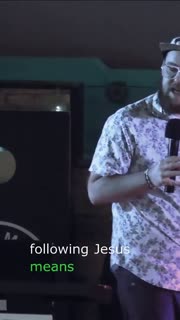Embracing God's Call: Commitment and Transformation
Summary
### Summary
Today, we explored the story of Elisha from 1 Kings 19:19-21, focusing on his calling and response to God's invitation. The narrative began with a personal anecdote about feeling unprepared and overwhelmed, which set the stage for understanding Elisha's journey. Elisha was found plowing his father's field when the prophet Elijah placed his cloak on him, symbolizing a divine calling. Despite being deeply entrenched in his current life, Elisha recognized the significance of this act and responded immediately, showing humility and respect by asking Elijah for permission to say goodbye to his parents.
Elisha's response was not just immediate but also drastic. He slaughtered his oxen and burned his plows, ensuring there was no turning back to his old life. This act symbolized total commitment to his new calling. The sermon emphasized that following Jesus requires recognizing and responding to His call, often at great personal cost. It highlighted that the journey of faith is challenging but ultimately rewarding, as the hard times refine and strengthen us.
The message concluded with a call to action: to pick up our crosses and follow Jesus, embracing the difficulties as part of the journey. The hard times are what make the journey worthwhile, and Jesus promises to be with us through every challenge.
### Key Takeaways
1. Recognize the Call: Elisha recognized the divine calling when Elijah placed his cloak on him. This act was a significant symbol of God's invitation to a higher purpose. Similarly, we must be attentive to God's call in our lives, understanding that He has a unique plan for each of us. Recognizing this call is the first step towards fulfilling our divine purpose. [12:20]
2. Immediate Response: Elisha's immediate reaction to leave his oxen and run after Elijah demonstrates the urgency and importance of responding to God's call without hesitation. Delayed obedience can lead to missed opportunities. When God calls, our response should be swift and wholehearted, showing our readiness to follow His lead. [16:30]
3. Humble and Human Response: Elisha's request to say goodbye to his parents shows humility and respect. It also highlights the human aspect of following God's call, acknowledging the emotional and relational costs involved. True discipleship often requires us to make difficult choices that may not be understood by those around us, but honoring God should always be our priority. [17:50]
4. Burning the Plows: By slaughtering his oxen and burning his plows, Elisha ensured there was no turning back to his old life. This act of total commitment is a powerful reminder that following Jesus requires us to leave behind our old ways and fully embrace the new path He sets before us. It symbolizes a complete and irreversible dedication to God's calling. [22:33]
5. Embrace the Hard: Following Jesus is challenging and often involves significant sacrifices. However, these hardships are what make the journey meaningful and transformative. The difficulties we face refine our faith and draw us closer to God. Embracing the hard times with the assurance that Jesus is with us makes the journey not just bearable but profoundly rewarding. [26:42]
### YouTube Chapters
[0:00] - Welcome
[01:19] - Youth Group Pioneering
[04:01] - The Outsiders Series Introduction
[05:28] - Prayer and Introduction to Elisha
[06:14] - Context of 1 Kings
[08:48] - Israel's Decline and Prophets
[10:30] - Elisha's Calling
[12:20] - Recognize the Call
[16:30] - Immediate Response
[17:50] - Humble and Human Response
[21:17] - Burn the Plows
[26:42] - Embrace the Hard
[29:56] - Call to Action and Closing Prayer
Study Guide
### Bible Study Discussion Guide
#### Bible Reading
1. 1 Kings 19:19-21
2. Luke 14:26
3. Luke 9:62
#### Observation Questions
1. What was Elisha doing when Elijah found him, and what did Elijah do to signify Elisha's calling? ([10:30])
2. How did Elisha respond to Elijah's symbolic act of placing the cloak on him? ([11:20])
3. What drastic actions did Elisha take to show his commitment to his new calling? ([21:55])
4. According to the sermon, what does Jesus say about the cost of following Him in Luke 14:26? ([20:14])
#### Interpretation Questions
1. Why is recognizing God's call in our lives important, and how did Elisha's recognition of his call change his life? ([12:20])
2. What does Elisha's immediate response to Elijah's call teach us about the urgency of responding to God's call? ([16:30])
3. How does Elisha's request to say goodbye to his parents reflect both humility and the human aspect of following God's call? ([17:12])
4. What does it mean to "burn the plows" in the context of following Jesus, and why is this significant for our faith journey? ([22:33])
#### Application Questions
1. Reflect on a time when you felt unprepared or overwhelmed by a task God called you to. How did you respond, and what did you learn from that experience? ([01:19])
2. Elisha recognized the divine calling when Elijah placed his cloak on him. How can you be more attentive to recognizing God's call in your own life? ([12:20])
3. Elisha's immediate response to God's call was to leave everything behind. What might be holding you back from responding immediately to God's call in your life? ([16:30])
4. Elisha showed humility and respect by asking to say goodbye to his parents. How can you balance honoring your relationships while prioritizing God's call? ([17:12])
5. Elisha burned his plows to ensure there was no turning back. What "plows" in your life might you need to burn to fully commit to following Jesus? ([22:33])
6. Jesus said that following Him comes with a cost. What sacrifices have you made or might you need to make to follow Jesus more closely? ([20:14])
7. The sermon emphasized that the hard times in our faith journey make it worthwhile. How can you embrace the challenges in your life as opportunities for growth and deeper faith? ([26:42])
Devotional
Day 1: Recognize the Divine Call
Elisha recognized the divine calling when Elijah placed his cloak on him. This act was a significant symbol of God's invitation to a higher purpose. Similarly, we must be attentive to God's call in our lives, understanding that He has a unique plan for each of us. Recognizing this call is the first step towards fulfilling our divine purpose. Elisha's story teaches us the importance of being spiritually alert and ready to respond when God reaches out to us. It is a reminder that God’s call can come at any moment, often when we least expect it, and it requires our full attention and discernment.
[12:20]
1 Samuel 3:10 (ESV): "And the Lord came and stood, calling as at other times, 'Samuel! Samuel!' And Samuel said, 'Speak, for your servant hears.'"
Reflection: Think about a time when you felt a nudge or a call from God. How did you respond, and what can you do to be more attentive to His call in the future?
Day 2: Respond Immediately to God's Call
Elisha's immediate reaction to leave his oxen and run after Elijah demonstrates the urgency and importance of responding to God's call without hesitation. Delayed obedience can lead to missed opportunities. When God calls, our response should be swift and wholehearted, showing our readiness to follow His lead. This immediate response is a testament to Elisha's faith and trust in God's plan for his life. It challenges us to examine our own readiness to act when God calls us, encouraging us to prioritize His will over our own plans and comforts.
[16:30]
Matthew 4:20 (ESV): "Immediately they left their nets and followed him."
Reflection: Reflect on a recent situation where you felt prompted to act but hesitated. What held you back, and how can you cultivate a heart that responds immediately to God's call?
Day 3: Humility in Following God's Call
Elisha's request to say goodbye to his parents shows humility and respect. It also highlights the human aspect of following God's call, acknowledging the emotional and relational costs involved. True discipleship often requires us to make difficult choices that may not be understood by those around us, but honoring God should always be our priority. This humility is crucial in our walk with God, as it allows us to recognize our dependence on Him and the importance of maintaining respectful relationships even as we pursue His calling.
[17:50]
Philippians 2:3-4 (ESV): "Do nothing from selfish ambition or conceit, but in humility count others more significant than yourselves. Let each of you look not only to his own interests, but also to the interests of others."
Reflection: Consider a relationship in your life that might be affected by your commitment to follow God. How can you approach this situation with humility and respect while staying true to your calling?
Day 4: Total Commitment to God's Call
By slaughtering his oxen and burning his plows, Elisha ensured there was no turning back to his old life. This act of total commitment is a powerful reminder that following Jesus requires us to leave behind our old ways and fully embrace the new path He sets before us. It symbolizes a complete and irreversible dedication to God's calling. Elisha's actions challenge us to evaluate our own level of commitment to God, urging us to let go of anything that might hold us back from fully following Him.
[22:33]
Luke 9:62 (ESV): "Jesus said to him, 'No one who puts his hand to the plow and looks back is fit for the kingdom of God.'"
Reflection: Identify something in your life that you need to "burn" or let go of to fully commit to God's calling. What steps can you take today to make this commitment?
Day 5: Embrace the Hardships of Following Jesus
Following Jesus is challenging and often involves significant sacrifices. However, these hardships are what make the journey meaningful and transformative. The difficulties we face refine our faith and draw us closer to God. Embracing the hard times with the assurance that Jesus is with us makes the journey not just bearable but profoundly rewarding. This perspective encourages us to view our struggles as opportunities for growth and deeper reliance on God, knowing that He is with us every step of the way.
[26:42]
James 1:2-4 (ESV): "Count it all joy, my brothers, when you meet trials of various kinds, for you know that the testing of your faith produces steadfastness. And let steadfastness have its full effect, that you may be perfect and complete, lacking in nothing."
Reflection: Think about a current challenge you are facing. How can you embrace this hardship as a part of your journey with Jesus, and what can you learn from it to strengthen your faith?
Quotes
### Quotes for Outreach
1. "Have you ever been in a situation where you come to that weird crystallizing realization that you have no idea what you're doing? Anybody? Have you ever been there before? Like one of those situations where you don't even know how you got in this situation, let alone what to do now that you are there in the midst of it." [01:19]
2. "Elisha recognized the call. The first thing we can see from these verses is that Elisha recognized the calling that God had for his life. Let's look at verse 19 again. It says this, So Elisha went and found Elisha's son, Shaphat, plowing a field. There were twelve teams of oxen in the field, and Elisha was plowing the twelfth pair. Elisha went over to him and threw his cloak across his shoulders, and he said, So something I want to point out is the significance of what is going down here." [12:20]
3. "Church, if we want to be part of what God is up to in our world today, I think the first thing that we need to do is to recognize that just like Elisha, God has also placed a calling on our shoulders as well. Now, sure, we all have to make a living, right? Whether that's working a farm or working at the mine or being a cashier or flipping burgers. That's not what I'm talking about. But what I am talking about, though, that Jesus has called each and every one of us to live for him, to walk in relationship with him, to spread his name wherever we go." [14:54]
4. "Following Jesus means there will always be a cross to take up. Jesus even says as much himself in Luke 14. In verse 26, he tells his disciples this. If anyone comes to me and does not hate father and mother, wife and children, brothers and sisters, yes, even their own life, such a person cannot, cannot be my disciple. Now, real quick, Jesus isn't saying that we literally need to hate our families. Far from it. But following Jesus, I think it ought to strengthen our love for our family. But what he is saying is that following him has a price tag." [20:14]
5. "The hard is what makes it good. And church, I gotta say, that's not just true about baseball. But that's the truth about following Jesus. Because I'll be real with you, it is hard. Following Jesus, if I could, I am confident in saying this, following Jesus is the hardest thing I have ever done. It's the hardest thing I've ever done in my life. And it's supposed to be hard. Jesus says so himself that the chosen are many, or the workers are many, but the chosen are few. It's supposed to be hard. Because the hard, church, is what makes it good." [26:42]
### Quotes for Members
1. "So this morning, we're going to talk about the cultural significance of the things that just happened. So this morning, as we dive in, I want to kind of peel back some of the layers here, and I want to dissect these three short verses, because in doing so, I think we can begin to see how Elisha, he was able to begin to walk into the position that God was preparing for him, and I think we'll be able to see how Elisha, even though he had no idea what he was doing, he decided to give it a shot and to go for it anyways. Amen?" [12:20]
2. "Elisha's response is it shows us the very real costs that come with following Jesus. Because when we begin to follow him, church, he becomes our new master. You know, a number of years ago, I went to church with an older couple whose son was serving on this long-term mission to this impoverished church. This impoverished country in Africa. I don't remember what country it was, but him and his wife, they were so far from America that it actually took, what did they say, like nine separate plane flights and half a day of driving just to reach the village that they lived in. They went to the literal ends of the earth to bring the gospel to a people that knew nothing about Jesus." [18:31]
3. "Elisha burned the plows. Write that down this morning, church. If we want to walk in the promises of God, I think some of us need to start to burn some of our plows. Verse 21 tells us this. So Elisha returned to his oxen and slaughtered them. He used the wood from the plow to build a fire to roast the flesh. He passed around the meat to the townspeople. They all ate. And he went with Elisha as his assistant. So outside of telling us about the awesome barbecue, they had anyone hungry yet? I think these verses, I think they show us something important when it comes to following Jesus. And what I think it shows us is that, honestly, we can't sit on the fence forever." [21:55]
4. "The hard is what makes it good. And church, I gotta say, that's not just true about baseball. But that's the truth about following Jesus. Because I'll be real with you, it is hard. Following Jesus, if I could, I am confident in saying this, following Jesus is the hardest thing I have ever done. It's the hardest thing I've ever done in my life. And it's supposed to be hard. Jesus says so himself that the chosen are many, or the workers are many, but the chosen are few. It's supposed to be hard. Because the hard, church, is what makes it good." [26:42]
5. "Pick it up anyway. It's one decision. I promise you, you will never regret. Amen? Amen. Church, as we close this morning, would you pray with me? Join me. Thank you so much for checking out today's message. I sincerely hope God was able to meet you where you're at and speak into your life in a new way today. If you want to connect with us, click on the connect link in the description. Whether you need prayer or if you just want someone to talk to, we'd love to reach out. If you want to support the ministry financially, click on the give link in the description. Every dollar goes to continuing the movement started by Jesus himself over 2,000 years ago. Lastly, if you want to hang out with us in person, we gather every week on Sunday, Sunday, and Sunday. It's on Sundays at 11 a.m. Hope you all have a great week. We'll catch you next time." [29:56]








